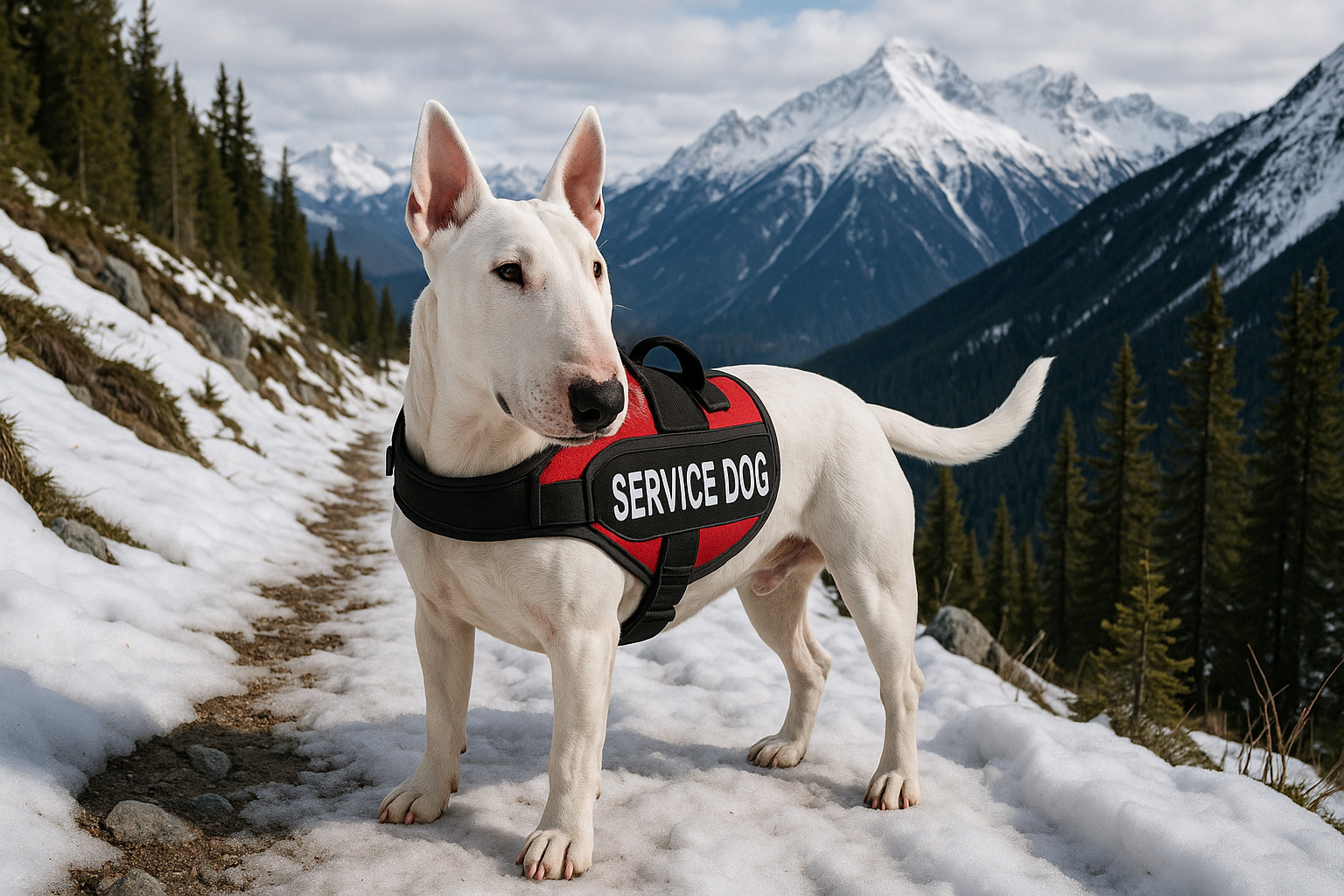Miniature Bull Terrier as a Service Dog
Get Your Documents

The Miniature Bull Terrier is a distinct and charismatic breed known for its robust personality and unique appearance. While they possess many endearing qualities, their suitability as service dogs requires careful examination. This article delves into various aspects of the Miniature Bull Terrier, analyzing their physical attributes, temperament, and other factors essential in determining their capacity as effective service animals.
Miniature Bull Terrier Overview
The Miniature Bull Terrier, a breed that descends from the larger Bull Terrier, shares many of its cousin’s traits but in a more compact stature. Renowned for their egg-shaped heads and muscular bodies, these dogs are as strong in character as they are in physique.
Physical Characteristics
Miniature Bull Terriers are robustly built and muscular dogs with a distinctive appearance:
- Size and Weight: Standing at about 10-14 inches at the shoulder and weighing between 20-35 pounds, their compact but solid structure is both a strength and a limitation.
- Strength: Despite their size, these dogs have significant physical strength, allowing them to be suitable for tasks requiring a degree of resistance or force.
- Energy Level: They are highly energetic and require ample exercise to maintain health and temperament, making them more suitable for active handlers.
While their size makes them manageable, their robust build is not ideal for roles that demand the agility or reach that a larger dog might provide. However, their strength and vigor are advantageous for certain types of tasks.
Temperament and Attitude
The temperament of the Miniature Bull Terrier is characterized by a lively and spirited nature:
- Playfulness: Known for their playful demeanor, these dogs bring joy and energy to their handlers, although this trait requires careful management in serious service roles.
- Confidence: They possess a confident, sometimes even stubborn, personality, which can be both an advantage and a challenge in training.
- Social Nature: They generally enjoy human interaction and can be sociable with a variety of people, beneficial for public environments.
- Sensitivity to Environment: They thrive in environments that provide mental and physical stimulation, although they may become distressed in monotonous or highly stressful situations.
The Miniature Bull Terrier’s personable nature and confidence suit them for certain service roles, especially where interaction is frequent, but their strong will can pose training challenges.
Types of Service Work
While the Miniature Bull Terrier can be trained for various forms of service work, their size and temperament tend to fit best in certain niches:
- Psychiatric Service Dogs: Their affectionate nature enables them to offer comfort and emotional support, which is beneficial in supporting individuals with PTSD, anxiety, or depression.
- Medical Alert Dogs: Their keen sense of hearing and smell can be harnessed for medical alert tasks, such as detecting changes in blood sugar levels or alerting for seizures.
- Therapeutic Support: Their amiable and engaging nature serves well in environments where their role is to provide companionship and non-specialized support.
The Miniature Bull Terrier is less suitable for tasks requiring physical assistance of significant magnitude, such as mobility assistance, given their limited size and weight.
Health Considerations
Like all breeds, the Miniature Bull Terrier has health considerations that can impact their service role:
- Deafness: A condition prevalent within the breed, affecting their ability to respond to auditory commands, critical in service work.
- Skin Conditions: Prone to allergies and dermatitis, which could require ongoing medical management and might impact their reliability for service tasks.
- Eye Disorders: Conditions such as lens luxation are common and could compromise their visual acuity and general health.
- Cardiovascular Health: Regular health screenings for heart conditions are recommended, as they can affect their stamina and longevity in service roles.
While they possess many physical strengths, the potential for health issues necessitates regular veterinary care and monitoring, which could limit the extent of their service capability.
Training and Suitability
Training a Miniature Bull Terrier for service work requires commitment and understanding of their unique behavioral traits:
- Intelligence: These dogs are intelligent, which can aid training but may also manifest in a desire for independence and creativity that challenges their obedience.
- Stubbornness: Their tenacious nature requires a handler who is patient and consistent, employing positive reinforcement and setting clear expectations.
- Socialization: They benefit from early and extensive socialization, necessary to ensure they remain adaptable and composed in various environments.
Trained properly, they can perform tasks reliably, though it may take more effort than breeds that naturally submit more readily to training.
Summary of Miniature Bull Terrier
In summary, the Miniature Bull Terrier possesses a combination of strengths and limitations when considering its role as a service dog:
- Strengths:
- Compact and manageable size
- Energetic and lively disposition
- Affectionate and engaging nature
- Suitable for medical alert and psychiatric services
- Weaknesses:
- Potential for health issues like deafness or skin conditions
- Strong-willed and sometimes stubborn temperament
- Limited physical ability for significant mobility assistance tasks
- Ideal Service Roles:
- Best suited for roles that benefit from their size, such as emotional support or psychiatric service
- Effectively perform in tasks requiring detection or alert capabilities
The suitability of a Miniature Bull Terrier as a service dog hinges on understanding and working within their capabilities and health parameters. Their endearing qualities make them valuable companions, particularly for individuals requiring emotional or alert support rather than physical assistance.
Get Your Documents
Example State Cards













